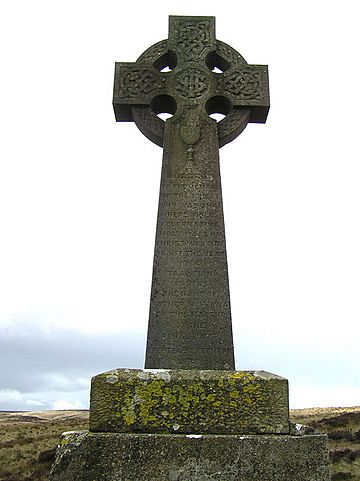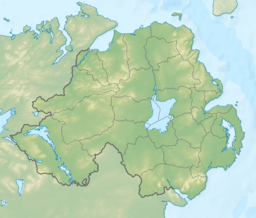Sliabh Beagh facts for kids
Quick facts for kids Slieve Beagh |
|
|---|---|

Bragan Penal Cross.
|
|
| Highest point | |
| Elevation | 380 m (1,250 ft) |
| Prominence | 285 m (935 ft) |
| Listing | County Top (Monaghan), Marilyn |
| Naming | |
| English translation | mountain of birch |
| Language of name | Irish |
| Geography | |
| Location | County Monaghan, County Fermanagh, County Tyrone |
| Parent range | Fermanagh/Tyrone Mountains |
| OSI/OSNI grid | H523436 |
| Official name: Slieve Beagh | |
| Designated: | 28 July 2000 |
| Reference #: | 1035 |
Slieve Beagh or Sliabh Beagh (Irish: Sliabh Beatha) is a mountain area. It sits on the border between three counties. These are County Monaghan in the Republic of Ireland, and County Fermanagh and County Tyrone in Northern Ireland. The very top of Slieve Beagh is on the border between Fermanagh and Tyrone. But a spot just east of the main peak is the highest point in County Monaghan. The place where all three counties meet is called the "Three County Hollow".
Contents
What's in a Name?
The mountain's original Irish name is Sliabh Beatha. This name has been changed to Slieve Beagh in English. Some people also use the half-English name Sliabh Beagh.
According to old Irish mythology, the name comes from a person named Bith. She was said to be buried in a stone pile, called a cairn, on top of the mountain. There is a cairn on the summit today, named Doocarn. However, it's more likely that the name Sliabh Beatha originally meant "mountain of birch trees". In County Monaghan, local people often call Slieve Beagh the "Bragan Mountains". This name comes from a nearby townland (a small area of land) called Bragan.
Exploring Slieve Beagh's Geography
Slieve Beagh has many low, smooth tops. The highest point is about 380 meters (1,247 feet) tall. This highest point is located just inside County Fermanagh.
The area is mostly covered in blanket bog. This is a type of wet, peaty land. You can find many small lakes and streams all over the mountain. In Northern Ireland, a large part of Slieve Beagh is a Special Area of Conservation. This means it's a protected place because of its important nature.
Fun Things to Do: Hiking and Walks
The Sliabh Beagh Way is a long walking path. It is about 25 miles (40 kilometers) long. The walk starts in County Tyrone at St Patrick's Chair and Well. It then goes through County Monaghan. Finally, it ends in Donagh in southeast Fermanagh.
Besides the main path, there are 31 other loop walks. These are shorter circular trails. They range from 2.5 miles (4 kilometers) to 12 miles (19 kilometers) long. These walks let you explore different parts of the beautiful Slieve Beagh area.
Slieve Beagh: A Special Wetland Site
Slieve Beagh is also a very important wetland area. It is known as a Ramsar site. This means it's a wetland of international importance. It was named a Ramsar site on December 14, 1999. The area covers about 1,885 hectares (4,658 acres).
This site is special because it has a large and healthy example of a blanket bog. It is one of the best examples of this type of habitat in the United Kingdom. It also has important examples of other wet areas. These include fens (wetlands with special plants) and lakes.
Plants and Animals of Slieve Beagh
The peatland (boggy land) has different features. These include small hills of moss and wet, grassy areas. There are also some small pools and wet spots where water flows. The plants here are mostly sphagnum mosses and small, woody shrubs.
Some rare and unusual plants grow here. These include cowberry and special mosses like Sphagnum fuscum and Sphagnum imbricatum. There are also lakes in the higher areas. These lakes have few plant species but do have aquatic mosses. The plants floating in or near the water are usually sparse. They form a thin edge of swampy or acidic fen plants.
The area is home to many birds. These include red grouse, Eurasian golden plover, and hen harrier. These birds breed (have their young) in Slieve Beagh.
The lakes in the higher areas also have interesting insects. The water beetle (Agabus arcticus) and the water bug (Callicorixa wollastoni) are common. There are more of these insects here than anywhere else recorded in Northern Ireland. The most special insects are found in Lough Sallagh, the highest lake. Here, you can find the rare upland beetle Potamonectes griseostriatus and the water bug Glaenocorisa propinqua.
Images for kids
 | Selma Burke |
 | Pauline Powell Burns |
 | Frederick J. Brown |
 | Robert Blackburn |



